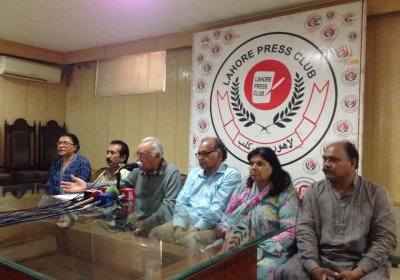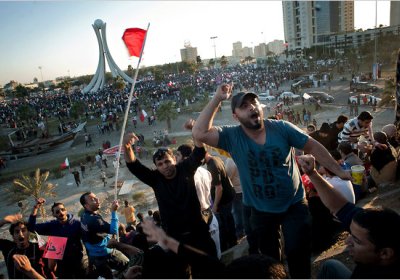The following statement was released by Aasim Sajjad Akhtar, Punjab president of the Awami Workers Party, in response to the Pakistani government stating it intended to join the US-backed Saudi-led military intervention in Yemen.
* * *
Saudi Arabia
Yemeni President Abdu Rabbu Mansour Hadi, his prime minister and entire cabinet resigned en masse on January 23, just 24 hours after Houthi rebels occupied the presidential compound in Sana'a. The resignations give unprecedented power to the Houthis, a Shi'ite minority from the country’s isolated northern highlands.
The political crisis also opens the door to an all-out war over control of the Yemeni capital, involving Sunni political factions and al Qaeda in the Arabian Peninsula (AQAP). The conflict could also draw in Saudi Arabia, the United States and Iran.
King Abdullah bin Abdulaziz of Saudi Arabia has died at the age of 90. Abdullah was one of the world’s most powerful men and a key US ally in the region, controlling a fifth of the known global petroleum reserves.
In a statement, President Barack Obama praised Abdullah for his “steadfast and passionate belief in the importance of the US-Saudi relationship as a force for stability and security in the Middle East and beyond.”
This speech was given by Tony Iltis of Socialist Alliance to a rally in Melbourne on November 8, calling on the Saudi government to free dissident Sheikh Nimr Baqir al-Nimr. Al-Nimr is a popular Shia sheikh who has been critical of Saudi authorities, suggesting in a 2009 sermon that the Eastern Province would secede if its Shia population's rights were not respected.
Protesters took to the streets of Melbourne on August 16 to condemn human rights abuses by Saudi Arabia and to call for the release of Shia cleric Ayatollah Nimr Baqr al-Nimr, who has been sentenced to death by crucifixion and beheading for calling for religious freedom in the kingdom.
Saudi Arabia is both an absolute monarchy and a theocracy. The regime promotes a Wahhabi interpretation of Sunni Islam, notorious for narrowly defining Islam and intolerance toward other beliefs.
It is now two years since spontaneous mass uprisings against political and economic injustice started to sweep through the Arab countries. This began a period of heightened class struggle known in the West (but not the Arab countries) as the Arab Spring.
Hamza Kashgari, a Saudi Arabian newspaper columnist, was recently extradited from Malaysia to Saudi Arabia, where he had been arrested while trying to flee to New Zealand.
An arrest warrant was issued in Saudi Arabia after Kashgari posted three twitter comments deemed to be insulting to the prophet Mohammed. Kashgari fled the country.
The three mild posts included lines such as: "I have loved things about you and I have hated things about you and there is a lot I don't understand about you."
A secret cable sent from the US Embassy in Riyadh, Saudi Arabia, in 1996, released by WikiLeaks, provides an in-depth account of the processes of wealth distribution and waste within the ruling House of Saud.
The cable noted: “Royals still seem more adept at squandering than accumulating wealth.” It said corruption abounded largely unchecked.
It was the view of the US embassy in Saudi Arabia that getting a grip on royal family excess was at the top of pressing concerns for the oil-rich US ally.
The pro-democracy movement in Bahrain has been severely weakened by the brutal wave of repression that began on March 15.
Attempts to reignite pro-democracy protests have been broken up by government security forces and strikes have been called off.
Troops from Saudi Arabia and the United Arab Emirates entered Bahrain on March 14 to help the Bahraini government “restore order” by attacking thousands of pro-democracy protesters.
The pro-democracy protests in Bahrain and Saudi Arabia have the potential to have a huge impact on world politics. The stakes are very high.
In Bahrain, Saudi Arabia’s tiny island neighbour, protesters have mobilised in their hundreds of thousands for weeks to demand the Khalifah royal family be removed from power.
Bahrain is of great strategic importance for the West. It hosts the US Navy's fifth fleet and a US airbase. This helps ensure US control of the oil-rich Persian Gulf region and the ability to maintain a constant threat against Iran.
Two recent reports, released by NASA and the US National Climate Data Centre, have confirmed that last month was the warmest June since records began.
June was the fourth consecutive month that had broken temperature records, the US National Oceanic and Atmospheric Administration (NOAA) said. Global monthly records were also broken in March, April and May.
June was the 304th month in a row that recorded a global average temperature higher than the 20th century average. February 1985 was the last month temperatures fell below the average.
A 19-year-old Saudi Arabian woman has been sentenced to 200 lashes and 6 months in jail following an incident in 2006 in which she was kidnaped and gang-raped by seven men. When the kidnapping occurred, the woman was in a car in the company of a man who was not an immediate relative, a crime in the Saudi kingdom.
- Previous page
- Page 4
- Next page








